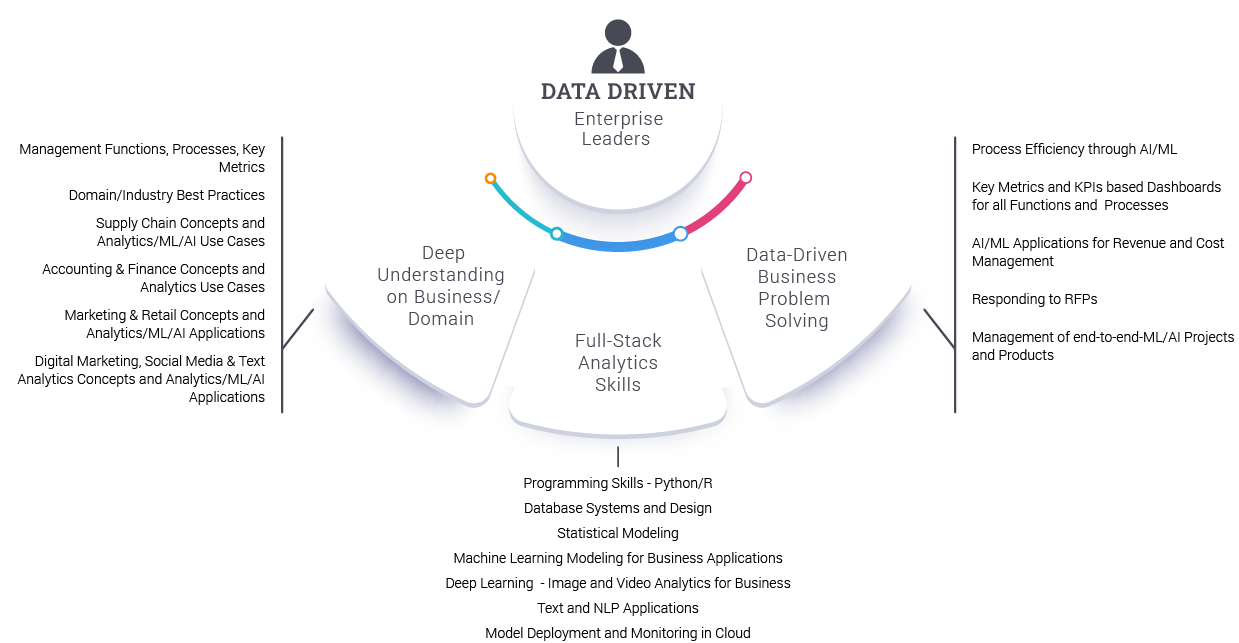MS in Business Analytics (BA): A Comprehensive Guide

What is Business Analytics?
Business analytics (BA) is the process of analysing data to gain insights that drive business planning and strategy. Following the fast-paced business landscape, data has become the cornerstone of decision-making. It involves the use of statistical analysis, predictive modeling, and other analytical techniques to uncover patterns, trends, and correlations within data sets. With business analytics, organizations can make informed choices, simplify processes, and gain a competitive edge in their respective domains.
The Importance of Business Analytics
In modern corporate houses where vast data is generated from various sources (customer transactions, social media interaction moderns, IoT devices, etc.) at an unprecedented rate, the importance of business analytics cannot be overstated. Business analytics plays a crucial role in transforming raw data into actionable insights. By analyzing data patterns and trends, businesses can uncover valuable information about their customers, competitors, and market dynamics. It empowers businesses to anticipate future trends by leveraging predictive analytics and proactively respond to changing market conditions like changes in customer demand, identify potential risks, and capitalize on emerging opportunities.
What is an MS in Business Analytics (BA)?
As a result of the high demand for skilled professionals, many individuals are considering pursuing a Master of Science (MS) in Business Analytics (BA) to gain the necessary expertise in data analysis to be in demand across different industries.
An MS in Business Analytics is an advanced specialized graduate degree program designed that cover a wide range of topics, including statistical analysis, data mining, predictive modeling, and data visualization to equip learners with the knowledge and skills of how to collect, analyze, and interpret data to make strategic decisions and solve complex business problems to excel in the field of data analysis and business intelligence securing a variety of roles in data-driven organizations.
Different Types of MS in Business Analytics Programs
As the need for business analytics professionals continues to rise, universities and colleges are offering a variety of MS in Business Analytics programs to accommodate the different needs and preferences of the learner. Let’s explore different types of Business Analytics programs offered in the market encompassing full-time, executive, and online degrees.
Full-time Programs: Full-time MS in Business Analytics programs typically span one to two years and are designed for students who can commit to studying on a full-time basis.
Executive Programs: Executive MS in Business Analytics programs, equivalent to full-time programs are most preferred and demanded by mid-career professionals who want to enhance their skills and knowledge in data analytics while continuing to work that offers weekend classes, allowing executives to balance their studies with their professional responsibilities.
Online Programs: Online MS in Business Analytics programs provide a flexible and convenient option for students who prefer to study remotely, ideal for those who are unable to relocate for their studies.
MS in Business Analytics Program Overview
Before embarking on this educational journey based on the needs, it’s essential to understand the program’s key components, including the syllabus, program structure and duration, and admission eligibility requirements.
Syllabus: The syllabus of an MS in Business Analytics program is carefully crafted to provide students with a comprehensive understanding of data analysis techniques, tools, and applications. The MS program includes advanced topics such as statistical analysis, data mining, machine learning, and data visualization. It also covers specialized topics such as predictive modeling, business intelligence, and big data analytics.
Program Structure and Duration
The structure and duration of an MS in Business Analytics program can vary depending on the institution and program format.
| Program Type | Tenure | Ideal for | Admission Eligibility |
| Full Time | 2 Years | Student/On Career Break | Any Graduates |
| Executive | 2 Years/ 1 Year | Working Professionals | Graduates with a minimum of 2 to 3 years of work experience |
| Online | Based on the program curriculum | Anyone | Based on the program’s needs |
Specializations within MS in Business Analytics
Participants in the MS in Business Analytics program undergo a transformative experience, where they gain specialized knowledge and skills. Throughout the two-year duration and beyond, they explore various facets of data analysis, refining their abilities to address complex business challenges using sophisticated frameworks.

Image source: Copyright belongs to REVA Academy for Corporate Excellence – RACE, REVA University
Future Scope after MS in Business Analytics in India
In India, the demand for skilled professionals in the field of business analytics is on the rise, driven by the increasing importance of data-driven decision-making across industries. Pursuing a Master of Science (MS) in Business Analytics can open doors to a wide range of career opportunities in both the private and public sectors.
Career Steps Involved in Business Analyst Roles
Following graduation with an MS in Business Analytics, career progression involves acquiring experience, mastering skills and tools, and transitioning through different roles based on expertise and work history. Graduates navigate from entry-level to executive positions, leveraging acquired skills to adapt to varying responsibilities and advance in their careers.
Here’s the list of career roles in Business Analytics:
| Sr. No | Roles Synergy |
| 1 | Entrepreneur or Business Owner |
| 2 | Academic or Researcher |
| 3 | Data Analytics Trainer or Educator |
| 4 | Industry Specialist |
| 5 | Analytics Architect |
| 6 | Data Analytics Product Manager |
| 7 | Director of Analytics |
| 8 | Data Science Manager |
| 9 | Senior Consultant |
| 10 | Consultant or Data Analytics Strategist |
| 11 | Chief Data Officer |
| 12 | Data Product Manager |
| 13 | Data Scientist |
| 14 | Data Engineer |
| 15 | Business Intelligence Analyst |
| 16 | Analyst Manager |
| 17 | Senior Data Analyst |
| 18 | Jr. Data Analyst (Entry Level) |
MS in Business Analytics Salary in India
With the increasing need for skilled data analysts and business intelligence experts enriched with years of experience, the salary prospects for individuals with an MS in Business Analytics are promising. Salaries for this role commonly range from ₹14.0 lakhs to ₹42.9 lakhs per annum (India and abroad).
FAQs About MS in Business Analytics Programs
Check the above list in the Blog.
An MS in Business Analytics is a valuable investment with a significant ROI. Graduates typically earn competitive salaries ranging from ₹14.0 lakhs to ₹42.9 lakhs per annum in India and abroad, making it a lucrative career choice.
For admission to an MS in Business Analytics program, typical prerequisites include a minimum of 50% in the undergraduate program (45% for SC and ST candidates). Eligible candidates must hold a bachelor’s degree in any stream, such as B.Tech, BCA, B.Sc. (IT/CS/Electronics), B.Com, or BBA with Computer Applications. Those with B.Com/BBA degrees should have studied Mathematics or Statistics at the +2 level. Additionally, applicants with other degrees, including any B.Tech/BE degree (including M.Tech), MCA, or MSc in IT/ISICS, are also considered eligible for admission.
Typical prerequisites include a minimum of 50% in the undergraduate program (45% for SC and ST candidates).
When drafting your statement of purpose for an MS in Business Analytics program, ensure clarity in expressing your motivation, showcasing pertinent experiences, and demonstrating proficiency in quantitative analysis and programming. Customizing your SOP for each program, emphasizing your career objectives, and seeking feedback for improvement is key to crafting an authentic narrative that reflects your enthusiasm and suitability for the program.
Yes, scholarships and financial aid options vary by institute and may be merit-based. For instance, RACE offers discounts for women participants on International Women’s Day. Additionally, universities offer multiple payment options through their tie-ups with banks and other financial institutions
The job market outlook for MS in Business Analytics graduates is highly favourable. With the increasing demand for data-driven decision-making across industries, there is a growing need for professionals with advanced analytical skills.
Starting salaries for MS in Business Analytics graduates typically range from ₹14.0 lakhs to ₹42.9 lakhs per annum, both in India and abroad. However, actual salaries may vary depending on factors such as skills, experience, and geographic location.
Employers value MS in Business Analytics graduates who possess strong technical skills in data analysis, programming, and data visualization, coupled with effective communication, problem-solving abilities, and business acumen.
BA professionals can join groups on platforms like LinkedIn, Facebook, and Quora for networking and insights. You can visit RACE on LinkedIn to gain access to a wider community of working professionals for industry updates.
As the field of Business Analytics grows with more professionals entering, challenges arise, but prestigious institutions like RACE provide abundant opportunities such as guaranteed placement support, industry mentorship, and extensive networks.
Consider enrolling in a UGC-approved university that provides extensive support and real-time experience with live industry projects to gain an upper hand under the mentorship of industry pioneers
Embark on a transformative career journey with RACE REVA’s specialized MS program in Business Analytics. Crafted by industry pioneers, this program catapults you into elite positions. Develop proficiency in devising and executing data-driven solutions, supported by a vast network of mentors and placement partners. Engage in over 20 mini projects, 2 full-scale capstone projects, and research opportunities to hone your skills and unlock lucrative opportunities globally, with substantial salary growth potential.



